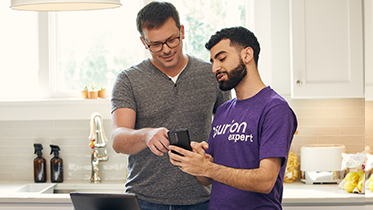Looking to host your own multiplayer matches or create a custom world for your friends? A dedicated game server lets you do just that—from the comfort of your home. With more control over settings, mods, and who can connect, running your own server can elevate your online gaming experience.
At Asurion, our experts help millions of gamers keep their tech running smoothly. Here's how to set up a dedicated server at home, whether you're playing Minecraft, ARK, or another multiplayer title.
What is a dedicated game server?
A dedicated server is a computer that runs game software separately from your own gaming device. Instead of joining a public server, your players connect to a server you host—giving you full control over the rules, mods, privacy, and uptime.
You can run a server on:
- A spare desktop or laptop
- A home media PC
- A virtual private server (VPS) if you want it cloud-hosted
What you’ll need to set up a game server
Before you get started, make sure you have:
- A reliable computer (ideally with a quad-core CPU, 8GB RAM, and SSD storage)
- A fast internet connection (upload speeds of 5 Mbps or higher recommended)
- Wired Ethernet (to reduce lag and ensure stable hosting)
- Access to your router’s port forwarding settings
- Basic familiarity with your game’s server files or console
How to set up a dedicated server at home
Here’s a simplified step-by-step guide, using a PC-based server as an example.
Step 1: Choose your game and download the server software
Most games that support private servers provide a downloadable server package. For example:
- Minecraft Java Edition: Download from the official Minecraft Server page.
- ARK: Survival Evolved: Use SteamCMD to download and run the dedicated server tool.
- Valheim: Comes with a built-in server tool in Steam’s Tools section.
Look up server setup documentation specific to your game.
Step 2: Set up port forwarding
To allow outside players to connect, you need to open specific ports on your router.
- Log in to your router (typically at 192.168.1.1).
- Find the Port Forwarding section.
- Add the game’s port number (e.g. 25565 for Minecraft).
- Point it to the local IP address of your host machine.
Step 3: Configure server settings
Each game has a config file or launcher where you can:
- Set player limits
- Add mods or plug-ins
- Set passwords or whitelists
- Control day/night cycles, PvP, or cheat permissions
Refer to your game’s documentation for config file paths and formatting.
Step 4: Test your server
Launch the server software, then try joining it from your own device using your internal IP address. Ask a friend to connect using your public IP to confirm outside access works.
Tips to keep your server running smoothly
- Use a dedicated machine: Don’t game and host on the same device if possible.
- Check your firewall: Allow your game and port through both Windows Defender and third-party firewalls.
- Back up your worlds regularly in case of crashes.
- Use scripts or tools to auto-restart the server after updates or restarts.
- Monitor performance to make sure your CPU/RAM usage stays in check during play.
What to do if your server isn’t working
If others can’t connect or you’re getting lag:
- Double-check port forwarding and firewall settings
- Make sure your ISP isn’t blocking certain ports
- Confirm you’re using the correct public IP
- Restart your router and server software
- Review your game’s log files for error messages
Still stuck? You can learn how to check your internet speed to ensure your connection can handle a server.
FAQ
Can I run a game server on a laptop?
Yes, but it’s best if the laptop is plugged in, connected via Ethernet, and not used for gaming at the same time.
Will running a server slow down my internet?
It can, especially if multiple people are connected or your upload speeds are low. Prioritize using a wired connection and close unused apps.
Do I need a static IP address?
It helps. A dynamic IP can change when your router resets. You can either reserve an internal IP or use a dynamic DNS service to link your IP to a domain.
What if I want to host multiple game servers?
You can—but each server will need a unique port, and you may need more bandwidth or computing power depending on the games.



